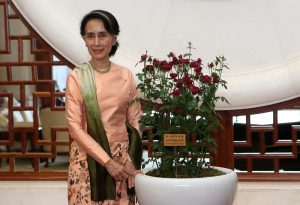Myanmar’s detained civilian leader Aung San Suu Kyi will give courtroom testimony for the first time later this month to defend herself on a charge of incitement, her lawyers announced yesterday.
According to the Associated Press, the 76-year-old Nobel laureate will testify in her own defense beginning on October 26. She will appear alongside two co-defendants charged with incitement: former President Win Myint, who is scheduled to testify on October 12, and Myo Aung, the former mayor of Naypyidaw, who will give testimony on November 2.
Unsurprisingly, all of the proceedings against the leader are closed to the public and press. The defense has declined to call any witnesses.
The incitement case refers to statements posted on the Facebook page of her National League for Democracy (NLD) party shortly after its overthrew by the military on the morning of February 1. It is just one of a list of charges that have been brought against the 76-year-old Nobel laureate by the military junta since its takeover. These include five counts of corruption, two counts of breaking COVID-19 pandemic restrictions during the 2020 election campaign, and – most surreally – the charge of illegally importing walkie-talkies. Aung San Suu Kyi has also been charged with breaching Myanmar’s colonial-era Official Secrets Act.
Since the coup, Aung San Suu Kyi has been detained by the military at an undisclosed location in the capital Naypyidaw. Her current health is uncertain. Last week, her lawyer Khin Maung Zaw requested that court sessions be held every two weeks rather than every week on the grounds of ill health, which caused her to miss a court hearing last month. “She is tired. At her age, it is not convenient to sit for hearings every day of the whole week,” he said. “It is not a concerning situation. She is just tired.”
The announcement from Aung San Suu Kyi’s lawyers comes after her former ally Phyo Min Thein, the chief minister of Yangon Region prior to the coup, testified at a concurrent corruption trial last week that he had handed to her large amounts of cash and gold. This closely echoed the claim of the military-controlled Anti-Corruption Agency that Aung San Suu Kyi illegally accepted $600,000 in bribes and seven pieces of gold.
Each of the four corruption charges, which include two of accepting bribes and two of conspiring to carry out corruption in connection with real estate transactions (the fifth has yet to go to trial), carries a penalty of up to 15 years’ imprisonment. A guilty verdict on any of these charges would probably be enough to rule Aung San Suu Kyi out of politics permanently.
Indeed, this is undoubtedly the purpose of the junta’s battery of charges. Aung San Suu Kyi currently faces enough charges that they the authorities have the option of either keeping her tied up in court indefinitely, while convictions on any number of them would be enough to consign her to another long spell of house arrest or prison.
Whether the junta succeeds in writing Aung San Suu Kyi out of Myanmar’s story remains to be seen, however. Seeded by her exalted lineage – her father Aung San is widely considered the father of Myanmar’s independence – the myth of “The Lady” grew to outsized proportions during her long years of confinement to her family’s crumbling lakeside home in Yangon. There is therefore every chance that the military’s current persecution will simple reinforce her symbolic power.
To be sure, the current resistance to the coup government is motivated by more than just a drive to restore “Mother Suu” to her throne; indeed, the failure of the NLD’s engagement with the military during the reforms of the 2010s has radicalized many young activists and led them to move beyond the NLD-centered tradition of democratic advocacy. Nonetheless, as long as resistance to the military junta continues, the trials against her could have the unintended effect of making her a bigger icon than ever.

































